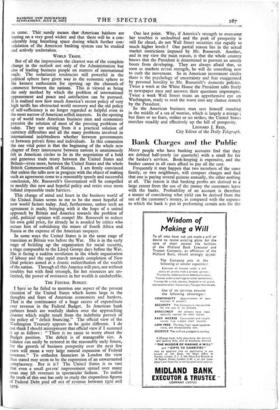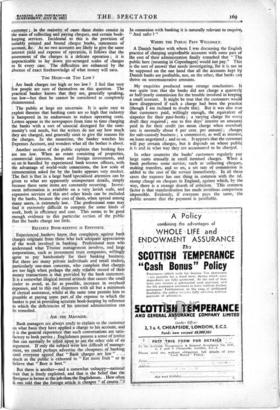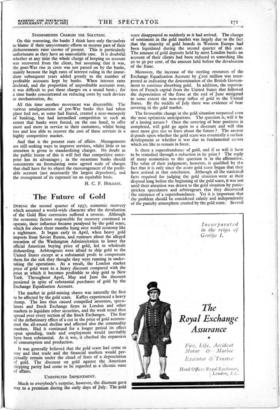Bank Charges and the Public
MANY people who have banking accounts find that they are debited half-yearly (or quarterly) with a small fee for the banker's services. Book-keeping is expensive, and the banker cannot in all cases afford to pay all the cost.
Frequently it may happen that two members of the same family, or two neighbours, will compare charges and find that one is paying several guineas annually, the other nothing at all. The reason is that banking profits are derived to a large extent from the use of the money the customers leave with the banks. Profitability of an account is therefore a matter of considering what yield can be derived from the use of the customer's money, as compared with the expense to which the bank is put in performing certain acts for the customer ; in the majority of cases these duties consist in the main of collecting and paying cheques, and certain book- keeping services. Incidental to this is the provision of suitably printed and bound cheque _books, statements of account, &c. As no two accounts are likely to give the same interest yield and expense of operation, it follOws that the assessment of the charges is a delicate operation ; it is impracticable to lay down pre-arranged scales of charges to fit every case. The difficulties are enhanced by the absence of exact foreknowledge of what money will earn.
Too HIGH—OR Too LOW ?
Are bank charges too high or too low ? I feel that very few people are sure of themselves on this question. The practical banker knows that they are, generally speaking, too low—but then he cannot be considered as completely disinterested.
The public at large are uncertain. It is quite easy to exploit theories that banking costs are so high that industry is hampered in its endeavours to reduce operating costs. Letters appear in the newspapers from time to time charging the banks with a sort of unsocial disregard for the com- munity's real needs, but the writers do not say how much they are charged, and generally omit to give the reasons for the charges. In the meantime, the banker watches his Expenses Account, and wonders what all the bother is abotit.
Another section of the public explains that banking fees are too low. When an estate consisting of properties, commercial interests, home and foreign investments, and so, on is ,handled by experienced bank trustee officers, with the advantage of world-wide connexions, the low scale of remuneration asked for by the banks appears very modest. The fact is that in a large bank specialised attention can be given to what are apparently unimportant details, simply because these same items are constantly recurring. Invest- ment information is available on a very lavish scale, and expensive services of this and other kinds can be included by the banks, because the cost of them, when spread among many users, is extremely- low. The professional man may find it extremely difficult to compete for some kinds of work, both in efficiency and cost. This seems to be good enough evidence to this particular section of the public that the banks charge too little.
RELIABLE BOOK-KEEPING IS EXPENSIVE.
Experienced .bankers know that complaints against bank charges Originate from thOie who lack adequate appreciation of the work involved in banking. Professional men who understand what Tinstee management involves, and large corporations, such as investment trust companies, willingly agree to pay handsoinely for iheir banking business. But there are many private individuals and small traders, Particularly one-man concerns, who complain that charges are too high when perhaps the only reliable record of their money transactions is that provided by the bank statement. It is a somewhat illogical mental attitude that causes the small trader to avoid, as far as possible, increases in overhead expenses, and to this end dispenses with all but a minimum Of clerical assistance, whilst at the same time permits him to grumble at paying some part ,of the expense to which the banker is put in providing accurate book-keeping by reference to which the deficiencies of his internal administration can be remedied.
ASK • THE MANAGER: Bank managers are alivays ready to explain to the customer On what basis they have applied a charge to his account, and it is the general experience that such conversations are satis- factory to both parties ; Englishmen possess a sense of justice that can normally be relied upon to ;see, the other side of an argument. If only the snbject were less difficult of manage- ment, we could perhaps advertise the cheapness . of banking Until everyone agreed that " Bank charges are low . . . much as the public is exhorted to " Eat more fruit " or to believe that " Beer is best."
. But there is another—and a somewhat unhappy—national trait that is freely exploited, and that is the belief that the foreigner is better at the jobahan.the Englishman How often is one told that the foreie article is cheaper " of course.' In connexion with banking it is naturally relevant to enquire, " And safer ? "
WHERE THE PUBLIC PAYS WILLINGLY. • A Danish banker with whom I was discussing the English practice of charging unprofitable accounts with some part of the cost of their administration finally remarked that " The public here (meaning in Copenhagen) would not pay." This is the sort of answer that needs investigating, for it is not to be supposed on the one hand that all the accounts kept by Danish banks are profitable, nor, on the other, that banks calf; thrive on unremunerative amounts.
My enquiries produced some strange conclusions. It was quite true . that the banks did not charge a quarterly or half-yearly commission for the trouble involved in keeping a small account. It might be true that the customers would have disappeared if such a charge had been the practice (though I am inclined to doubt this). But it was also true that customers paid, willingly enough, the equivalent of sixpence for their pass-books ; a varying charge for every draft they .required ; one to five days' interest on amounts paid in for their credit (no mean charge when overdraft rate is normally about 6 per cent. per annum) ; charges for safe-custody business ; a commission, as well as interest on loans negotiated ; and so on. It appears that the customec will pay certain charges, but it depends on whose public it is and in what way they are accustomed to be charged.
In other countries the banks' customers regularly pay large sums annually. in small itemised charges. When a bank performs some service, such as -collecting cheques, making transfers, and so on, a set rate of commission is added to the cost of the service immediately. In all these cases the expense has one thing in common with the 2d. stamp charge on cheques in England, against which, by the way, there is a strange dearth of criticism. - This common factor is that standardisation has made invidious comparison impossible. Evidently, if everyone pays the same, the public assume that the payment is justifiable.
STANDARDISED CHARGES THE SOLUTION.
On this reasoning, the banks I think have only the7aselves to blame if their unsystematic efforts to recover part of their disbursements raise storms of 'protest. This is particularly unfortunate as they have an unassailable case. It is doubtful whether at any time the whole charge of keeping an account was recovered from the client, but assuming that it was, the post-War rise in costs was not passed on by the banks, mainly because the high rates of interest ruling in the imme- diate subsequent years added greatly to the number of profitable accounts kept by banks. When interest rates declined, and the proportion of unprofitable accounts rose, it was difficult to put these charges on a sound basis ; for a time banks concentrated on reducing costs by such devices as mechanisation, &c.
All this time another movement was discernible. The various amalgamations of pre-War banks that had taken place had not, as some had feared, created a near-monopoly of banking3 but had intensified competition to such an extent that banks were forced, on the one hand, to offer more and more in service to their customers, whilst being less and less able to recover the cost of these services in a highly competitive market.
And that is the present state of affairs. Managements are still seeking ways to improve services, whilst little or no attention is given to standardising charges. No doubt as the public learns of this it will feel that competitive enter- prise has its advantages ; in the meantime banks should concentrate on formulating some agreed scale of charges that shall have for its object the encouragement of the profit- able account (not necessarily the largest depositors), and the recoupment of its expenses on an equitable basis.
H. C. F. HOLGATE.
































































 Previous page
Previous page